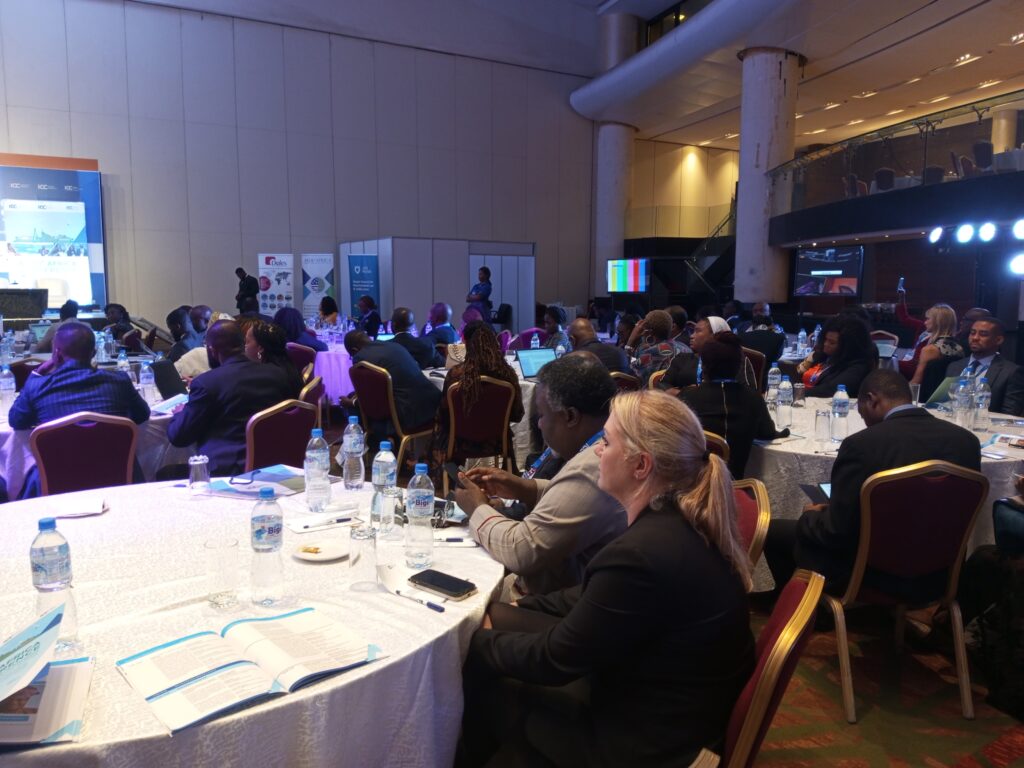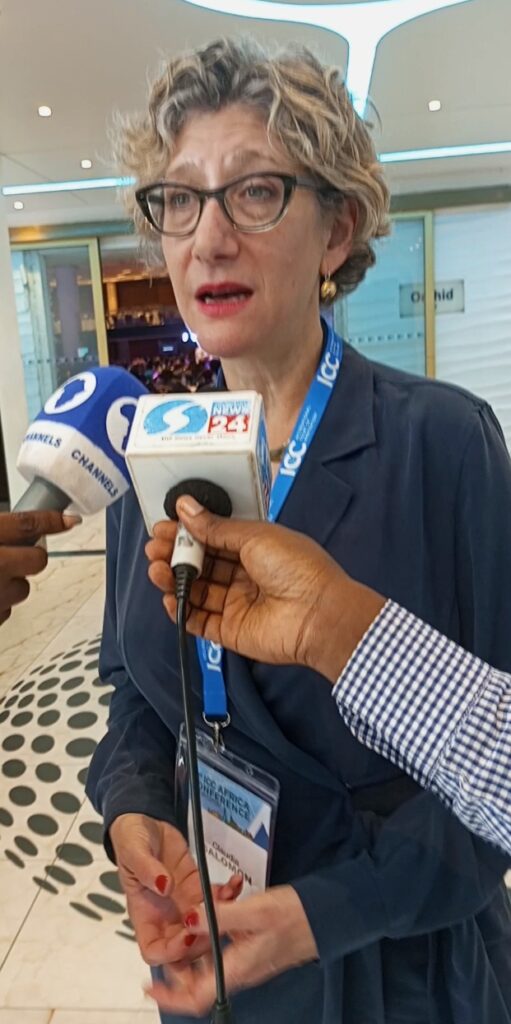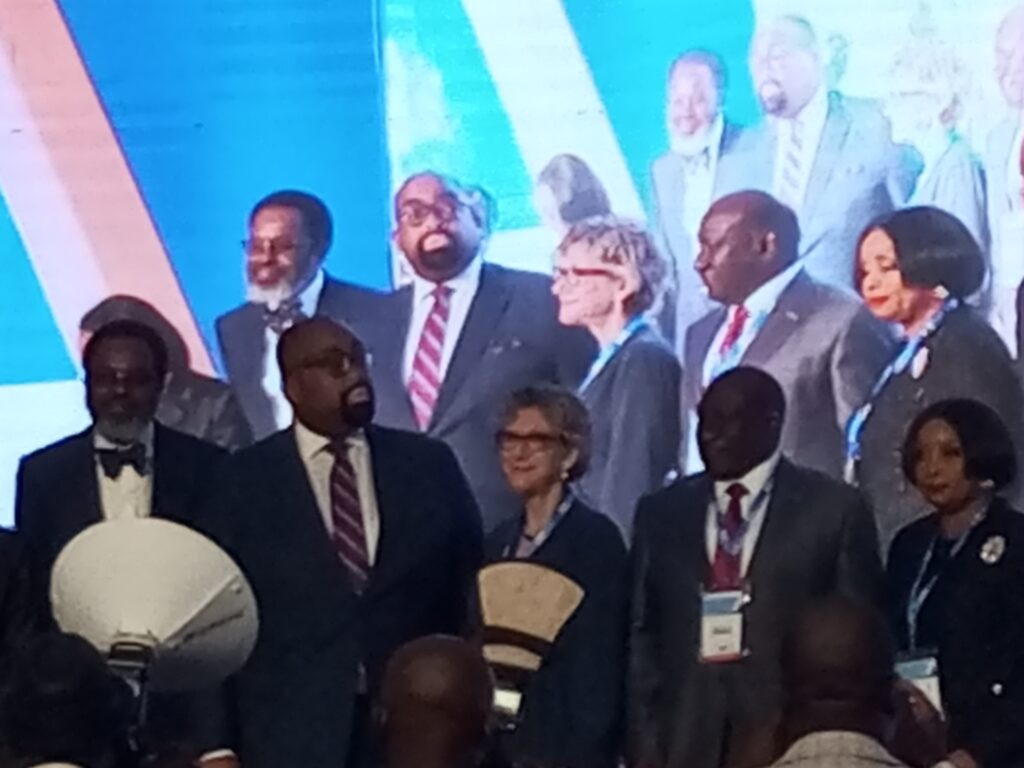The 6th ICC Africa Conference on International Arbitration has ended with renewed outlook for arbitrators as nuggets capable of enhancing dispute resolution resonated at the event.
This is the aura that permeated the air at the conclusion of the well attended three days meeting organised by International Chamber of Commerce, ICC, supported by the Nigerian Bar Association, NBA, held at the Eko Hotel, Victoria Island, Lagos.

The conference was themed “African Arbitration: Consolidation and Transformation.”
Participants from countries like Ghana, Sierra Leone, United Arab Emirates, Canada, Nigeria inclusive had no small measure of capacity enhancing take-aways.
For lawyers and clients, the interventions discussed for resolving disputes in the energy, construction, and other sectors, couldn’t have come at a better time.
Discussants charted forward looking ways to combat challenges, promoted best practices, and advocated for reforms to outdated laws.

Wamkele Mene, the Secretary General, African Continental Free Trade Agreement Area AfCTA, during his keynote address said, “We are determined to resolve trade dispute, investments disputes through the AfCTA and settlement mechanism.
“We also want to develop our own African jurisprudence on matters related to trade.”
He disclosed, “Africans have 43 countries committed to the agreement in resolving disputes.”
“Disputes will always arise whether in commerce, investment and certainly in our case, in the context of a free trade agreement which essentially is a contract, among, in the case, 43 countries who have ratified and deposited their instruments of ratification.
“Levels of compliance with court judgements and arbitral awards differ from state to state in Nigeria, and country to country in Africa, depending on how entrenched democracy is in the country.
President of Nigerian Bar Association, Olumide Akpata, noted at the event that the ICC creates a platform to foster ideas in the international best practice.
He however, pledge to ensure that sanctity of upholding arbitration award is upheld in the country.
He observed that lawyers must be technically competent and key into trade arbitration and trade dispute arbitration to enhance arbitrary practice.
“It’s important for us to gain that knowledge for us to effectively participate in that process.”
He noted that International arbitration served as a dispute resolution in many ways and this include promoting international trade, adopting the social model role as well as increase in trade growth, and increase in the GDP globally.

Akpata said, “To this end, Nigeria accept the motion and process of amending its arbitration act, to bring it to date on best practices, this bill when sign into law will enhance the new regime of arbitration practices in Nigeria. It will introduce innovative ideas. The new bill which the NBA will continue to monitor will ensure that the practice of arbitration becomes attractive part of the law and ultimately makes Nigeria become an attractive arbitration haven.
“So, I encourage the ICC to make trade arbitration part of the curriculum so that we can develop the required competence,” Akpata said.
Also speaking at the international arbitration conference held in Nigeria, President, ICC International Court of Arbitration, Claudia Salomon said the whole purpose of ICC is to promote access to justice across border.

Speaking on whether a country’s apex court should be a court of first instance to resolve dispute, the first female president in almost 100 years of existence of ICC said, “There was a pioneer group of entrepreneurs who founded ICC in 1990, in the wake of World War 1, they were focused on promoting peace and prosperity in the course of their training and they understood that there needed to be a mechanism to resolve disputes.
“So there are 170 countries that have signed the New York Convention, that’s the treaty that provides for the enforcement of the arbitration of wars, it’s one of the most successful multinational treaties in the world.
“So when a court is enforcing a arbitration law it is interpreting the grounds for challenging arbitration laws, it is complying with the country’s obligations under that international training.”
Lagos State Governor, Mr. Babajide Sanwo-Olu ably represented by the State Attorney General/Commissioner of Justice, Mr. Moyosore Onigbanjo, SAN, noted that Lagos State remained an arbitration-friendly destination and that the state stands out in arbitration in Nigeria, stating that the Lagos Court of Arbitration, LCA, formed an integral part of the state’s commitment to promoting and upholding the rule of law.
“In addition to enhancing the Arbitration Law (Laws of Lagos State), the state established Lagos Court of Arbitration, LCA, National Centre for Arbitration and ADR, as a dispute resolution hub with the aim of promoting and servicing domestic, regional, continental and international commercial dispute industry, with a full complement of ADR services.”
The Governor in his keynote address also said the state’s judiciary had partnered with the LCA in helping to ensure prompt out-of-court resolution of disputes.

“Lagos State Judiciary has partnered with the Lagos Court of Arbitration for resolution of long-standing court cases.
“LCA is an integral part of our promise to promote the rule of law built as a pillar for economic development not just in Lagos but in Nigeria and Africa in general.”
Adding that with over 3,000 manufacturing industries and more than 400 financial institutions, Lagos currently holds about 65% of the federation’s total industrial investment and foreign trade while also attracting 70% of Nigeria’s commercial activities.
“Africa is currently an attractive investment destination, and influx of foreign investors who insist on arbitration as their preferred dispute settlement mechanism has increased international commercial arbitration,” he said.
Sanwo-Olu urged the ICC conference to address issues such as challenges of arbitrating in Nigeria and what a country must do to become an attractive destination.
Mrs. Adedoyin Rhodes-Vivour, SAN, Managing Director ‘Doyin Rhodes-Vivour & Co and member of ICC Court, Nigeria said arbitration was basically regulated by the Arbitration and Conciliation Act, ACA, Laws of the Federation of Nigeria 2004, which incorporates the 1985 United Nations Commission on International Trade Law, UNCITRAL, Model Law on International Arbitration.
She noted that any of the 36 states in the country is permitted to enact its arbitration laws and a few of them, such as Lagos and Rivers have done so.
The country has also signed and ratified the New York Convention on the Recognition and Enforcement of Foreign Arbitral Awards (New York Convention). By the provisions of the Convention, Nigerian courts ought to recognise and enforce arbitration awards as binding and enforceable.
They are also mandated by the New York Convention to uphold arbitration agreements by parties.
Personalities who graced the event were Secretary-General, AfCFTA, Mr. Mene; President, Nigerian Bar Association, NBA, Akpata; President, ICC International Court of Arbitration, Salomon; Chairman, ICC Nigeria, Babatunde Savage; Director for Africa, ICC Arbitration and ADR, Paris, Diamana Diawara; Chairperson, ICCN Commission on Arbitration & ADR, Dorothy Ufot, Senior Advocates of Nigeria, SAN, and Gbolahan Elias, SAN, Justice Babatunde Edwards, Chief Justice of Sierra Leone among many others from different parts of the continents.


